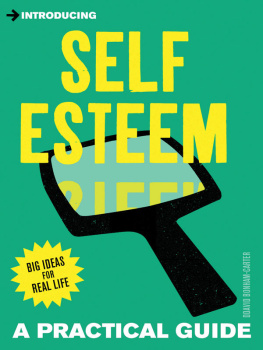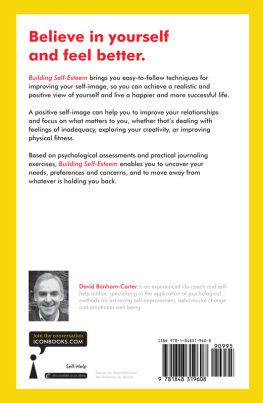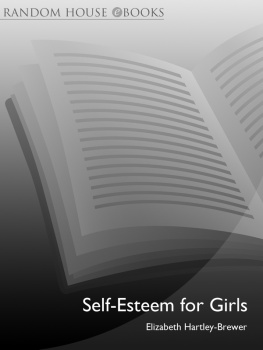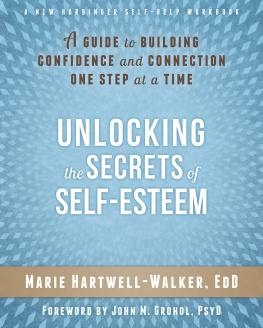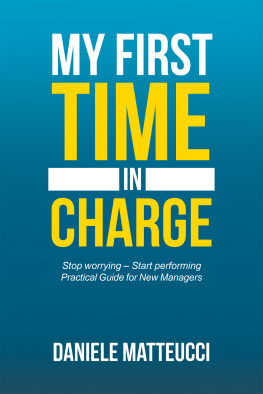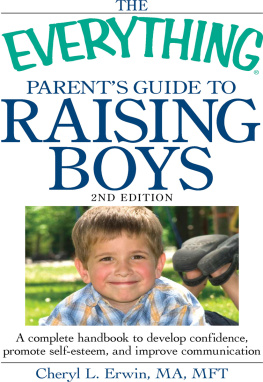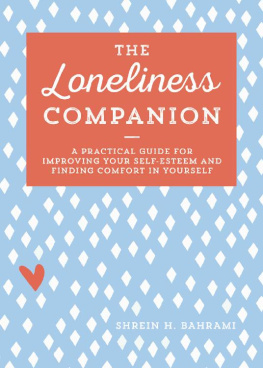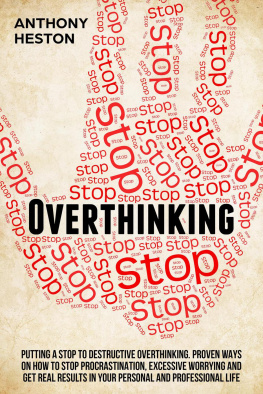David Bonham-Carter - Introducing Self-Esteem: A Practical Guide
Here you can read online David Bonham-Carter - Introducing Self-Esteem: A Practical Guide full text of the book (entire story) in english for free. Download pdf and epub, get meaning, cover and reviews about this ebook. year: 2012, publisher: Icon Books, genre: Religion. Description of the work, (preface) as well as reviews are available. Best literature library LitArk.com created for fans of good reading and offers a wide selection of genres:
Romance novel
Science fiction
Adventure
Detective
Science
History
Home and family
Prose
Art
Politics
Computer
Non-fiction
Religion
Business
Children
Humor
Choose a favorite category and find really read worthwhile books. Enjoy immersion in the world of imagination, feel the emotions of the characters or learn something new for yourself, make an fascinating discovery.
- Book:Introducing Self-Esteem: A Practical Guide
- Author:
- Publisher:Icon Books
- Genre:
- Year:2012
- Rating:5 / 5
- Favourites:Add to favourites
- Your mark:
- 100
- 1
- 2
- 3
- 4
- 5
Introducing Self-Esteem: A Practical Guide: summary, description and annotation
We offer to read an annotation, description, summary or preface (depends on what the author of the book "Introducing Self-Esteem: A Practical Guide" wrote himself). If you haven't found the necessary information about the book — write in the comments, we will try to find it.
Among many things, this practical guide shows you how raising your self-esteem can stop you worrying whether you are doing the right thing or whether you are good enough, help you engage in relationships constructively without putting yourself down, and allow you to assert yourself without worrying about others opinions.
Introducing Self-Esteem: A Practical Guide — read online for free the complete book (whole text) full work
Below is the text of the book, divided by pages. System saving the place of the last page read, allows you to conveniently read the book "Introducing Self-Esteem: A Practical Guide" online for free, without having to search again every time where you left off. Put a bookmark, and you can go to the page where you finished reading at any time.
Font size:
Interval:
Bookmark:


First published in the UK in 2012
by Icon Books Ltd,
Omnibus Business Centre,
3941 North Road,
London N7 9DP
email:
www.iconbooks.co.uk
This electronic edition published in the UK in 2012 by Icon Books Ltd
ISBN: 978-1-84831-366-8 (ePub format)
ISBN: 978-1-84831-367-5 (Adobe eBook format)
Printed edition sold in the UK, Europe,
South Africa and Asia
by Faber & Faber Ltd,
Bloomsbury House,
7477 Great Russell Street,
London WC1B 3DA
or their agents
Printed edition distributed in the UK, Europe,
South Africa and Asia
by TBS Ltd,
TBS Distribution Centre,
Colchester Road,
Frating Green,
Colchester CO7 7DW
Printed edition published in Australia in 2012
by Allen & Unwin Pty Ltd,
PO Box 8500, 83 Alexander Street,
Crows Nest, NSW 2065
Printed edition distributed in Canada
by Penguin Books Canada,
90 Eglinton Avenue East, Suite 700,
Toronto, Ontario M4P 2Y3
Printed edition published in the USA in 2012
by Icon Books
Inquiries to: Icon Books Ltd,
Omnibus Business Centre,
3941 North Road,
London N7 9DP, UK
Printed edition distributed to the trade in the USA
by Consortium Book Sales
and Distribution
The Keg House, 34 Thirteenth
Avenue NE, Suite 101,
Minneapolis, MN 55413-1007
Text copyright 2012 David Bonham-Carter
The author has asserted his moral rights.
No part of this book may be reproduced in any form, or by any means, without prior permission in writing from the publisher.
Typeset in Avenir by Marie Doherty
About the author
David Bonham-Carter is a life coach and writer on self-help topics who specializes in helping people struggling with self-esteem, anxiety, assertiveness and related difficulties. For many years David worked in the UK as a social worker helping people from a range of backgrounds to achieve positive changes in their lives through face-to-face work before setting up his own life coaching practice in Bristol. He has a Masters Degree in Social Work from the University of Kent (passed with distinction) and a Masters Degree in Philosophy from the University of Bristol. He has a particular interest in the use of cognitive behavioural therapy (CBT) techniques for helping people to develop self-esteem and assertiveness skills and he has written a number of guides to dealing with particular emotional and cognitive difficulties. More information about his life coaching service and his practical self-help guides is available at his website: www.davidbonham-carter.com.
David would like to thank Denise for her incisive and helpful comments on the first draft of the book.
It is the mind that maketh good or ill,
That maketh wretch or happy, rich or poor.
Edmund Spenser, The Faerie Queene, Book VI,
Canto IX
Contents
Introduction: The journey to self-esteem
Self-esteem and attitudes to the self
As human beings we make judgements all the time about the world we live in, the situations we are involved in and the people we come into contact with. If you have low self-esteem you make negative judgements about yourself much of the time. You feel that you are not good enough or that you do not act well enough. Self-esteem is therefore intimately connected with self-perception and goes to the core of your identity. In this book I aim to present you with some helpful ideas on self-esteem and dealing with negative thoughts about yourself, in a format that is informative and practical.
Different traditions and cultures have produced their own accounts of self-consciousness and desirable attitudes to take towards the self: the Chinese sage Lao Tzu counselled in the Tao Te Ching that mastering the self requires strength, the ancient Greek philosopher Socrates urged: Know thyself, and Ren Descartes ushered in modern Western philosophy with the famous observation I think therefore I am. Ideas from Hindu and Buddhist philosophical approaches and meditation techniques for observing yourself or letting go of thoughts have also been adapted by recent American and British self-help authors to help with self-esteem and other issues.
A new approach to self-esteem five key ingredients
To provide a new approach to self-esteem that is easy to follow, I have separated out the aspects of developing self-esteem into five key ingredients, each of which has a chapter devoted to it. Together the first letters of each of the five key ingredients combine to form the word VALUE:
Value yourself
Accept yourself
Look after yourself
Understand yourself
Empower yourself
on valuing yourself covers techniques that you can use for building a positive self-image and techniques for countering limiting beliefs that may be inhibiting you from developing your potential.
on accepting yourself covers techniques that you can use to help you develop an attitude of self-acceptance, both in putting negative thoughts about yourself in particular situations in perspective and in dealing with an overall sense of inadequacy, if that is something you experience.
on looking after yourself considers an area which is sometimes undervalued in discussions of self-esteem that of taking good care of your mind and body. This is important because your mental and physical health are often intimately connected.
on understanding yourself I start by examining potential causes of low self-esteem and move from there into illustrating how you can develop your own understanding and awareness of yourself, your identity and your personality in healthy ways that help to address negative voices from your past or present.
on empowering yourself brings you forward into the arena of developing your assertiveness and improving related communication skills in relationships.
The books conclusion then provides you with suggestions as to how you can build on the most relevant parts of what you have learned from the VALUE acronym by developing it into a purposeful plan for you to use.
A practical guide to self-esteem
The book is written as a practical guide. In each chapter I provide tips for you to follow and exercises to try out to help you develop the aspect of self-esteem that is being discussed. I also provide case studies to illustrate how individuals in particular situations might apply the techniques. In compiling the case studies I have drawn on my professional experience as a life coach working with people around self-esteem, as well as on my own personal experience and relationships. The people in the case studies are not real individuals but their dilemmas and efforts reflect concerns and approaches that are common among people that I have worked with or know.
Most of the exercises and techniques that I describe in the book follow a problem-solving approach. I discuss an issue that can create difficulties for your self-esteem, then explain techniques that you can use to help you deal with that issue in a constructive way, illustrating how to apply the techniques through the case studies.
Cognitive behavioural therapy (CBT)
We are living in an exciting period in the field of self-development. In recent times there has been a sea change in therapeutic approaches, with many people rejecting the old psychoanalytical accounts of what drives peoples actions and feelings in favour of practical, research-based psychological therapies that focus on addressing negative, distorted or disempowering thoughts in a constructive way.
Next pageFont size:
Interval:
Bookmark:
Similar books «Introducing Self-Esteem: A Practical Guide»
Look at similar books to Introducing Self-Esteem: A Practical Guide. We have selected literature similar in name and meaning in the hope of providing readers with more options to find new, interesting, not yet read works.
Discussion, reviews of the book Introducing Self-Esteem: A Practical Guide and just readers' own opinions. Leave your comments, write what you think about the work, its meaning or the main characters. Specify what exactly you liked and what you didn't like, and why you think so.

